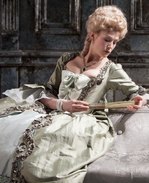SITE GUIDE
SEARCH
REVIEWS
REVIEW ARCHIVES
ADVERTISING AT CURTAINUP
FEATURES
NEWS
Etcetera and
Short Term Listings
LISTINGS
Broadway
Off-Broadway
NYC Restaurants
BOOKS and CDs
OTHER PLACES
Berkshires
London
California
New Jersey
DC
Philadelphia
Elsewhere
QUOTES
TKTS
PLAYWRIGHTS' ALBUMS
LETTERS TO EDITOR
FILM
LINKS
MISCELLANEOUS
Free Updates
Masthead
Writing for Us
A CurtainUp  London Review
London Review
 London Review
London ReviewMadame de Sade
| No will ever know what I have suffered due to the wild horse of my family.— Madame de Montreuil
|

Rosamund Pike as Madame de Sade (Photo: Johan Persson) |
These women are his wife Madame de Sade (Rosamund Pike), who the programme tells us represents wifely devotion; his mother in law Madame de Montreuil (Judi Dench), the bastion of law, society and morality; the virtuous Madame de Simiane (Deborah Finlay), a religious woman who becomes a nun; Madame de Saint-Fond (Frances Barber), who is eager carnality; Anne (Fiona Button), the younger sister of Madame de Sade, who is guileless and lacking in principles; and Charlotte the maid (Jenny Galloway), a representative of the Common People. Set in the decades leading up to the French Revolution, the de Sade story sees France at a period of revolutionary change.
The main problem with this play is not the direction or Christopher Oram's to die for beautiful set and gorgeous frocks but the language of Madame de Sade's stupid, flowery, romantic speeches about the excitement of her husband's perversion and cruelty to peasant girls recruited for the purpose of inflicting pain on those too weak or too poor to protest. We hear the ecstasy as the naked woman is suspended by her wrists while a peasant boy licks blood off her body and other bodily fluids. And this in a week when we see the trial of the sadistic monster Josef Fritzl. Did he have a philosophy which advocated the freedom to pursue incest, child rape and murder? What these speeches miss out on is any sense of the erotic. They are merely foolish, nasty, cruel and not fun at all. If this is a measure of pre-revolutionary France then the guillotine was long overdue! The whole play has this feeling of watching The Emperor's New Clothes, as if we are the only ones stupid enough to find it without merit.
Frances Barber camps it up well as the dissolute mistress relishing each excess of sexual behaviour with a riding switch to slap away at the furniture and her padded skirt. Rosamund Pike tries hard with some terrible lines full of lavish sentiment. Judi Dench seems disengaged, disheartened with her role as the mother in law to a male monster. Deborah Findlay as the virtuous one stuffs her fingers into her ears in order not hear some of the excesses — not a bad idea as it turns out!
I found myself wishing that Michael Grandage might have left the play in its original Japanese because to look at, it is quite divine. Christopher Oram gave us the burnished Caligula a brave choice of play which Grandage pulled off, the beautifully designed Othello, and he has excelled here with a huge set of verdigris metallic green and blue walls and doors with inlaid beading and ornate panelling, each scene being lit differently and the colours of the frocks changing. They start wearing gold, copper and bronzes, then appear in palest green silks and move to pale blue, creams and greys. The costumes deserve a place in a theatre museum with their use of pleated silks, embroidery, ribbons, gauze and the widest of skirts. It set me thinking about the upkeep of these extravagantly dressed women and their finery by the oppressed serving classes. The first time Rosamund Pike appeared on stage she quite took my breath away with her dreamy loveliness as she glided in, dressed in a ruched silk crinoline. But all this decoration cannot disguise the nastiness of this play.
This is the first time that this play has been done in London's West End. Unless tastes change drastically for the worse, it will probably be the last time.
| Madame de Sade
Written by Yukio Mishima Translated by Donald Keene Directed by Michael Grandage Starring: Judi Dench, Rosamund Pike, Frances Barber, Deborah Findlay With: Fiona Button, Jenny Galloway Design: Christopher Oram Lighting: Neil Austin Composer and Sound Design: Adam Cork Musical Director: Michael Haslam Running time: One hour 45 minutes without an interval Box Office: 0844 482 5120 Booking to 23rd May 2009 Reviewed by Lizzie Loveridge based on 19th March 2009 performance at the Wyndhams Theatre, Charing Cross Road, London WC2 (Tube: Leicester Square) |
|
REVIEW FEEDBACK Highlight one of the responses below and click "copy" or"CTRL+C"
Paste the highlighted text into the subject line (CTRL+ V): Feel free to add detailed comments in the body of the email . . . also the names and emails of any friends to whom you'd like us to forward a copy of this review. |
|
London Theatre Tickets Lion King Tickets Billy Elliot Tickets Mighty Boosh Tickets Mamma Mia Tickets We Will Rock You Tickets Theatre Tickets |




